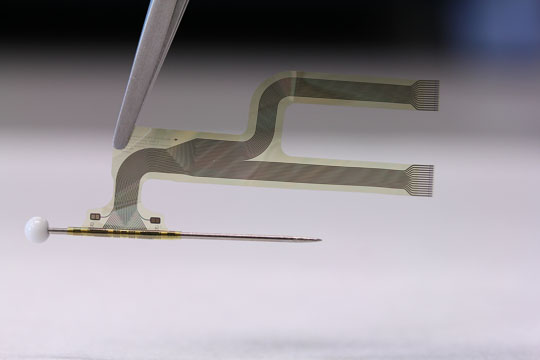Deception in the Depths
Freiburg, May 26, 2017
An innovation being developed by the medical technology company neuroloop – a spin-off of the University of Freiburg and the Freiburg University Medical Center – uses deception to help blood pressure patients. Their nerve stimulator, the "Baroloop" is a new type of thin film electrode that stimulates nerves to tell the brain that blood pressure has become excessively high. Blood pressure falls as a result.
 More than 20 million people in Germany suffer from high blood pressure. In the long term, the condition increases the risk of cardiovascular events such as heart attacks and strokes. Photo: stokkete/Fotolia
More than 20 million people in Germany suffer from high blood pressure. In the long term, the condition increases the risk of cardiovascular events such as heart attacks and strokes. Photo: stokkete/Fotolia
neuroloop's co-founders, CEO Dr. Michael Lauk and CTO Dr. Dennis Plachta say, "Our technology is the first alternative that lowers high blood pressure without medication." Their nerve stimulator works using natural baroreflexes. Baroreceptors in a person's arteries monitor blood pressure and transmit that information to the brain. If the brain detects blood pressure that is too high, baroreflexes respond to control it by reducing the heart rate and widening blood vessels, which cause blood pressure to fall. This regulatory system is disrupted in people who suffer from chronic high blood pressure, which is also known as hypertension. "Baroloop stimulates specific nerve fibers, which then transmit high blood pressure signals to the brain," explains Plachta. The difference between the actual and target values is so great that the baroreflex is triggered.
Up to now, the biggest barrier to a solution has been the complex vagus nerve. In humans, it is a veritable data highway made up of many nerve fibers that control a range of bodily functions. When the vagus nerve is stimulated, it generates droves of responses, including unpleasant nausea and coughing reflexes. To resolve that problem, Plachta – who is in charge of research at neuroloop – developed a new type of flexible, thin-film electrode. It is placed around the vagus nerve like a cuff. Within it are 24 stimulating circuits that the neuroscientist can activate individually. In this way, the device can selectively stimulate specific parts of the vagus nerve where primarily "blood pressure nerves" are located. When the Baroloop reduces blood pressure, there are hardly any undesirable side-effects.
 Neuroloop is developing a new type of teeny-tiny, thin-film electrode with 24 channels. It can be used to lower a person's blood pressure.
Neuroloop is developing a new type of teeny-tiny, thin-film electrode with 24 channels. It can be used to lower a person's blood pressure.
Photo: neuroloop
Market interest, but many rejections
In 2016, Baroloop received the research prize of the Forum of Applied Computer Science and Microsystem Technology. But the neurostimulator was already attracting attention in 2013 at the world's largest medical technology conference. "Representatives from several firms approached us there," explains Plachta. Their interest provided the impetus for founding the company neuroloop together with the University of Freiburg Professor of Biomedical Microtechnology, Thomas Stieglitz, the neurosurgeon Dr. Mortimer Gierthmühlen, and Prof. Dr. Josef Zentner of the University of Freiburg Medical Center. But when the founders began to seek financing for their innovation, they met with rejection. Prospective investors said their device was, "too complicated," "too expensive," or "too risky," and concluded, "you people have a long way to go."
Nevertheless, neuroloop still managed to quickly conclude a partnership with the medical technology company BBraun/Aesculap AG of Tuttlingen. Yet they were unable to reach agreement on prospective venture capital investors. That is when Prof. Dr. Bernhard Arnolds of Campus Technologies Freiburg GmbH brought in Michael Lauk. The physicist describes himself as a "company builder." He managed to convince Aesculap to develop Baroloop with its own, equity capital. He says a trail-blazing model for cooperation was established in this way. It allows Aesculap to later control the marketing of the product and advertise neuroloop in steps that have already been agreed. Meanwhile, neuroloop continues to develop the product. Says Lauk, "Everyone can concentrate on what they do well."
In 1998, Lauk had already started his first company "Seleon" – another University of Freiburg spin-off. Today, the medical technology service provider based in Heilbronn employs almost 85 people. More start-ups followed. Lauk says it's all "old hat" now, adding, "When daily operations start, I turn the company over to someone else." Currently he is involved in two start-ups in the US and two more in Freiburg, plus neuroloop. Lauk has developed more than 50 products with different teams. "I can understand the investors, manage a company, know the markets, and the international licensing processes. The time is right for Baroloop he says, adding, "The market for neurostimulators is booming at the moment."
Hope for millions of people
Neurostimulators – which are often called "pacemakers" – are already helping patients who suffer from migraines, chronic pain, overactive bladder and depression. Innovations would be welcome in treatment of high blood pressure. More than 20 million people suffer from the condition in Germany alone. When hypertension goes untreated, over time the risks of cardiovascular events such has heart attacks and strokes rise considerably. Yet the available medicines are not sufficiently effective for one in five patients. Baroloop could give them more quality of life and longer life expectancy.
Ultimately, that is what is really important to Lauk und Plachta. They expect their Barloop to be ready for the market in 2022. "We're already world champions when it comes to thin-film electrodes," says Lauk with pleasure. But the electronics need to be made safer and more reliable. After all, the stimulator is an implantable device. Contained in a small titanium shell, the electronics and electrodes are then surgically placed in the patient's neck. "If we can offer a product with good efficacy and fewer side effects, I would be pleased," says Lauk. Plachta has even more ambitious goals. "Research never ends," he says. Every discovery generates new questions and at some point, projects automatically move on and end up in other hands. He will be finished with baroloop when it is licensed for use. "I finally want to see something through from the beginning to the end," wishes Plachta. "I want to leave behind a lasting contribution. Something that my children can tell people about," he says.
Jürgen Schickinger
University of Freiburg Founders Office

